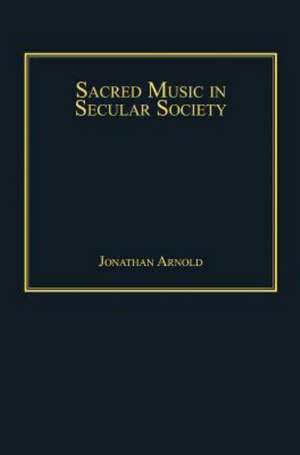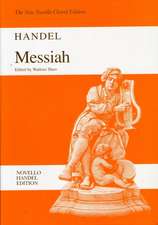Sacred Music in Secular Society
Autor Jonathan Arnolden Limba Engleză Hardback – 28 feb 2014
| Toate formatele și edițiile | Preț | Express |
|---|---|---|
| Paperback (1) | 381.92 lei 6-8 săpt. | |
| Taylor & Francis – 28 feb 2014 | 381.92 lei 6-8 săpt. | |
| Hardback (1) | 1054.58 lei 6-8 săpt. | |
| Taylor & Francis – 28 feb 2014 | 1054.58 lei 6-8 săpt. |
Preț: 1054.58 lei
Preț vechi: 1286.07 lei
-18% Nou
Puncte Express: 1582
Preț estimativ în valută:
201.79€ • 210.69$ • 167.01£
201.79€ • 210.69$ • 167.01£
Carte tipărită la comandă
Livrare economică 04-18 aprilie
Preluare comenzi: 021 569.72.76
Specificații
ISBN-13: 9781409451709
ISBN-10: 1409451704
Pagini: 188
Dimensiuni: 156 x 234 x 13 mm
Greutate: 0.45 kg
Ediția:New.
Editura: Taylor & Francis
Colecția Routledge
Locul publicării:Oxford, United Kingdom
ISBN-10: 1409451704
Pagini: 188
Dimensiuni: 156 x 234 x 13 mm
Greutate: 0.45 kg
Ediția:New.
Editura: Taylor & Francis
Colecția Routledge
Locul publicării:Oxford, United Kingdom
Recenzii
’As both a sacred musician and a scholar of historical theology, Jonathan Arnold is uniquely qualified to write this lucid and informed book. He tackles one of the most mysterious and fascinating questions in the area of theology and the arts: what is it about music that still appeals so vividly to modern people's sense of the spiritual? He explores this question in an engaging, open, accessible and enthusiastic way, bringing his own insights into conversation with some of the best-known composers, performers and theorists of sacred music at work today.’ Ben Quash, King’s College London, UK 'Jonathan Arnold explores the phenomenon of sacred music as a potent force, whether heard in its liturgical setting or the concert hall, to lead us beyond ourselves to the transcendent and the numinous. His thought-provoking survey draws upon the experience of those who create sacred music as composers or performers, whether as people of profound, uncertain or no faith, providing rich insights into the compelling mysteries and beauties of this treasure trove of music.’ John Scott, Organist and Director of Music, St Thomas Church, New York City, USA ’An intriguing, fresh look at the existence and role of music and its sublime effect. What is it that is so special about sacred music?’ Ralph Allwood, Director, Eton Choral Courses ’A valuable contribution to the study of sacred music in our world today.’ Stephen Layton, Trinity College, Cambridge, UK ’...stimulating and through the various interviews, offers many insights into the place of Sacred Music in Secular Society.’ Music and Liturgy ’Something concurs between music and the spirit. This book offers a series of vistas upon that concurrence. It also contains some heartfelt expressions of thankfulness for it, and is likely to leave the reader adding his or her own.’ Church Times
Notă biografică
Jonathan Arnold is Chaplain and Senior Research Fellow at Worcester College, Oxford. He is a Fellow of the Royal Historical Society, holds a Ph.D. from King’s College, London and is author of Dean John Colet of St. Paul’s: Humanism and Reform in Early Tudor England (London: I.B. Tauris, 2007) and The Great Humanists: An Introduction (London: I.B. Tauris, 2011). He is a former member of St. Paul’s Cathedral Choir and has performed as a soloist with many leading British and European orchestras and has sung with many fine vocal ensembles, including The Tallis Scholars and Polyphony. He was a regular member of The Sixteen for many years, travelling all over the world and appearing on many recordings and broadcasts.
Cuprins
Introduction; Part I The Practice of Sacred Music; Chapter 1 Composers – Midwives of Faith; Chapter 2 The Performers I: Within the Context of Religious Worship; Chapter 3 The Performers II: Outside the Context of Religious Worship; Part II The Reception of Sacred Music; Chapter 4 Who is Listening?; Chapter 5 Sacred Music: Culture and Society; Chapter 6 What is the Future of Sacred Music?; conclusion Conclusion;
Descriere
Sacred Music in Secular Society is a new and challenging work asking why Christian sacred music is now appealing afresh to a wide and varied audience, both religious and secular. Blending scholarship, theological reflection and interviews with some of the greatest musicians and spiritual leaders of our day, Arnold suggests that the intrinsically theological and spiritual nature of sacred music remains an immense attraction particularly in secular society. This book will appeal to readers interested in contemporary spirituality, Christianity, music, worship, faith and society, whether believers or not, including theologians, musicians and sociologists.







